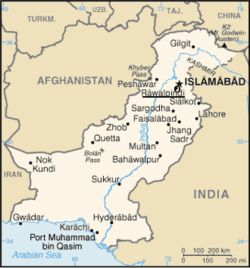| November 2009 Rawalpindi bombing | |
|---|---|
 Rawalpindi | |
| Location | Mall Road, Saddar, Rawalpindi |
| Date | 2 November 2009 1040 hrs (PST+5) |
Attack type | Suicide attack [1] |
| Deaths | 35 [2] |
| Injured | 60 [3] |
The November 2009 Rawalpindi bombing was a suicide attack carried out in front of the Mall Road branch of National Bank of Pakistan in Rawalpindi, Pakistan. The blast area was considered to be a very safe and high-security place. Tehrik-i-Taliban was blamed for this deadly blast, which occurred when the Pakistan government announced £3m in rewards for the capture of the Taliban leadership.